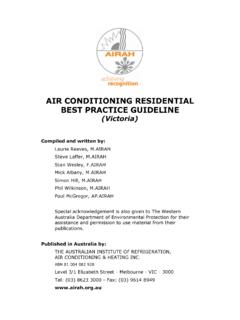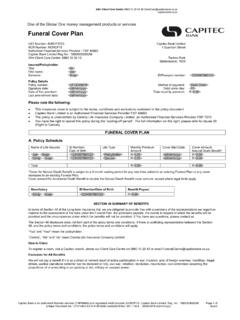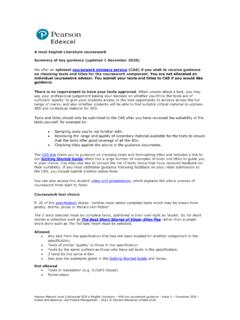Transcription of Cheat Sheets of the C standard library - ws3.ntcu.edu.tw
1 Cheat Sheets of the C standard library Version Last updated: 2012-11-28 About This document is a set of quick reference Sheets (or Cheat Sheets ) of the ANSI C standard library . It contains function and macro declarations in every header of the library , as well as notes about their usage. This document covers C++, but does not cover the C99 or C11 standard . A few non-ANSI- standard functions, if they are interesting enough, are also included. Style used in this document Function names, prototypes and their parameters are in monospace. Remarks of functions and parameters are marked italic and enclosed in /* and */ like C comments. Data types, whether they are built-in types or provided by the C standard library , are also marked in monospace. Types of parameters and return types are in bold. Type modifiers, like const and unsigned , have smaller font sizes in order to save space. Macro constants are marked using proportional typeface, uppercase, and no italics, LIKE_THIS_ONE.
2 One exception is L_tmpnum, which is the constant that uses lowercase letters. Example: int system ( const char * command ); /* system: The value returned depends on the running environment. Usually 0 when executing successfully. If command == NULL, system returns whether the command processor exists (0 if not). */ License Copyright 2011 Kang-Che Explorer Sung ( <explorer09 @ >) This work is licensed under the Creative Commons Attribution Unported License.. When copying and distributing this document, I advise you to keep this notice and the references section below with your copies, as a way to acknowledging all the sources I referenced. References The C++ Resources Network ( Most of the information in this document is from here.) The Open Group Base Specifications (Single UNIX Specification) C Runtime library reference in MSDN Wikipedia Linux man pages The C library Reference Guide by Eric Huss C++ Reference ( ) Dinkumware's Libraries Reference scanf and printf formats Type usually for integers: example %d Decimal (signed) -12345 %i scanf: Signed int, but allows octal, decimal, and hexadecimal input, depending on the prefix.
3 %u Decimal (unsigned) 53191 %o Octal 147707 %x %X Hexadecimal cfc7 Type usually for floating points: %f Fixed-point notation %e %E Exponential notation +005 %g %G %f or %e, whichever is shorter Type usually for text: %c Print a Character %s String %[] %[^ ] scanf: Scans only the characters in the set. ( %[^ ] excludes them instead) %[aeiou] %[^12345] Type special: %% Single % character %n Reads and prints nothing, but outputs the number of characters read/printed so far. (Argument must be an int* ) %p Pointer address Note For printf, * can be used in the field w idth or precision (or both). In that case the function takes an additional int argument preceding the argument to be formatted to specify the w idth or precision. (takes 2 arguments if both are *, like %*.*f ) strftime formats example %Y Year 2001 %y Year, last two digits (00 99) 01 %B Full month name [locale-dependant] August %b Abbreviated month name [locale-dependant] Aug %m Month as a decimal number (01 12) 08 %U Week number w ith Sunday as the first day of week (00 53) 33 %W Week number w ith Monday as the first day of week (00 53) 34 %d Day of the month (01 31) 23 %j Day of the year (001 366) 235 %A Full weekday name [locale-dependant] Thursday %a Abbreviated weekday name [locale-dependant] Thu %w Weekday as a decimal number w ith Sunday as 0 (0 6) 4 %Z Timezone name or abbreviation CDT %p AM or PM designation PM %I Hour in 12h format (01 12) 02 %H Hour in 24h format (00 23) 14 %M Minute (00 59) 55 %S Second (00 61) 02 %x Date representation [locale-dependant] 08/23/01 %X Time representation [locale-dependant] 14:55:02 %c Date and time representation [locale-dependant] Thu Aug 23 14:55:02 2001 %% Single % character % %[flags][width][.]
4 Precision][length]type Flags (for printf only, except for the * flag) %-4d 12 Left-justify the field instead of right. %+d +12 Always prepends the sign (+-). % d (space) 12 Inserts a space if there s no sign. %#o %#X 014 0xC (For o, x, X) Precedes value with 0 or 0x . %#.0f %#.0e 12000034. +007 (For f, e) Prints the decimal point even if no digits follow. %#.3g +007 (For g) Keeps trailing zeros, along w ith decimal point. %04d 0012 Pads the field with zeros instead of spaces. %*c scanf: Retrieves the data but discards it. Field width scanf: Maximum number of characters to be read. printf: Minimum number of characters to be printed. Precision (for printf only) %.4d 0012 (For d, u, o, x, X) Minimum number of digits to be printed. %.4f %.3e +001 (For f, e, E) Number of digits after the decimal point. %.4g (For g, G) Maximum number of significant digits. %.4s Prec (For s) Maximum number of characters to be printed. Length %hd %hf short ( half length) %ld %lf long (For long double, use %Lf.)
5 Cstdio < > functions File access: FILE * fopen ( const char * filename, const char * mode ); FILE * freopen ( const char * filename, const char * mode, FILE * stream ); /* mode parameter: "r|w|a[b][+]" (meaning: read/write/append, binary, for update) Examples: "rb+", "wb". Note that write erases the file content. The system supports at least FOPEN_MAX files open simultaneously. (stdin, stdout, and stderr included.) */ int fclose ( FILE * stream ); void setbuf ( FILE * stream, char * buffer ); /* buffer must have at least BUFSIZ bytes. */ int setvbuf ( FILE * stream, char * buffer, int mode, size_t size ); int fflush ( FILE * stream ); /* fclose, setvbuf, and fflush return 0 on success. mode parameter: _IOFBF (Full buffering), _IOLBF (Line buffering), _IONBF (No buffering) */ Formatted input/output: int fscanf ( FILE * stream, const char * format %!, .. ); int fprintf ( FILE * stream, const char * format %!, .. ); int scanf ( const char * format %!, .. ); stdin int printf ( const char * format %!)
6 , .. ); stdout int sscanf ( const char * str, const char * format %!, .. ); int sprintf ( char * str, const char * format %!, .. ); int vfprintf ( FILE * stream, const char * format %!, va_list arg ); int vprintf ( const char * format %!, va_list arg ); stdout int vsprintf ( char * str, const char * format %!, va_list arg ); /* scanf functions: return the number of items read, or EOF if error occurs. printf functions: return the number of characters written, or a negative value if error occurs. */ Character input/output: int fgetc ( FILE * stream ); /* Alias: getc */ int fputc ( int character, FILE * stream ); /* Alias: putc */ char * fgets ( char * str, int length, FILE * stream ); /* length includes terminating '\0'. */ int fputs ( const char * str, FILE * stream ); int getchar ( void ); stdin int putchar ( int character ); stdout char * gets ( char * str ); stdin (Deprecated) /* Unlike fgets, gets does not scan the '\n'! */ int puts ( const char * str ); stdout /* Appends a '\n' at the end!
7 */ int ungetc ( int character, FILE * stream ); /* fgetc, getchar, fputc, putchar, and ungetc: return the same character read/written, as an int. fputs and puts: return a non-negative value. fgets and gets: return str. All return EOF on error, except for fgets and gets, which return NULL. */ Direct (binary) input/output: size_t fread ( void * data, size_t size, size_t count, FILE * stream ); size_t fwrite ( const void * data, size_t size, size_t count, FILE * stream ); /* Both return the total number of elements successfully read/written. */ File positioning: int fgetpos ( FILE * stream, fpos_t * position ); /* Returns 0 on success. */ int fsetpos ( FILE * stream, const fpos_t * position ); /* Returns 0 on success. */ long int ftell ( FILE * stream ); /* Returns the current position, or -1L if error occurs. */ int fseek ( FILE * stream, long int offset, int origin ); /* Returns 0 on success. */ /* origin parameter: SEEK_SET (Beginning of file), SEEK_CUR (Current position), SEEK_END (End of file) */ void rewind ( FILE * stream ); Error-handling: int feof ( FILE * stream ); /* Can be triggered via Ctrl+Z (DOS/Windows) or Ctrl+D (Unix).
8 */ int ferror ( FILE * stream ); void perror ( const char * str ); stderr /* Outputs str: <error message (from errno)>\n */ void clearerr ( FILE * stream ); Operations on files: int rename ( const char * oldname, const char * newname ); /* Returns 0 on success. */ int remove ( const char * filename ); /* Returns 0 on success. */ FILE * tmpfile ( void ); /* File is created in "wb+" mode. Returns NULL on error. */ char * tmpnam ( char * str ); /* str must have at least L_tmpnam bytes. */ /* tmpnam: returns str, or a pointer to an internal buffer (if str == NULL), or NULL on error. */ : No buffer overflow protection (bound checking). Security issues may occur. %!: Be careful of format string attacks. cstdlib < > functions String conversion: int atoi ( const char * str ); long int atol ( const char * str ); double atof ( const char * str ); double strtod ( const char * str, char ** endptr ); long int strtol ( const char * str, char ** endptr, int base ); unsigned long int strtoul ( const char * str, char ** endptr, int base ); /* All return 0 (0L, or ) if no valid conversion can be done.
9 If the converted number is out of range, functions return the limit instead, and set errno = ERANGE. */ Pseudo-random sequence generation: int rand ( void ); /* Interval: [0, RAND_MAX]. Usually uses (rand() % range + offset) . */ void srand ( unsigned int seed ); /* Initial value of seed: 1. Usually uses srand(time(NULL)) . */ Dynamic memory management: void * malloc ( size_t size ); void * calloc ( size_t num, size_t size ); /* Initializes the memory block to zero. */ void * realloc ( void * ptr, size_t size ); /* Content is preserved even if the block is moved. */ void free ( void * ptr ); Environment: void abort ( void ); /* Sends SIGABRT. Ignores object destructors and atexit functions! */ void exit ( int status ); /* Macros constants available: EXIT_SUCCESS and EXIT_FAILURE. */ int atexit ( void (* function)(void) ); /* atexit: returns 0 on success. Registered functions are executed in reversed order as a stack. */ char * getenv ( const char * name ); /* getenv: returns NULL if the environment variable does not exist.
10 The string returned is an internal buffer and shall not be modified by the program. */ int system ( const char * command ); /* system: The value returned depends on the running environment. Usually 0 when executing successfully. If command == NULL, system returns whether the command processor exists (0 if not). */ Searching and sorting: void * bsearch ( const void * key, const void * base, size_t num, size_t size, int (* comparator)(const void *, const void *) ); void qsort ( void * base, size_t num, size_t size, int (* comparator)(const void *, const void *) ); /* bsearch: binary-searches the key in the array base (returns NULL if not found). qsort: sorts the array. base should have num elements, each element size bytes long, sorted / to be sorted by comparator. comparator should return whether its left parameter precedes, equals, or succeeds its right parameter in <0, ==0, >0 respectively. Examples: */ Integer arithmetics: int abs ( int n ); long int labs ( long int n ); div_t div ( int numerator, int denominator ); ldiv_t ldiv ( long int numerator, long int denominator ); /* div and ldiv: Return a structure w ith 2 members: quot (quotient) and rem (remainder).




